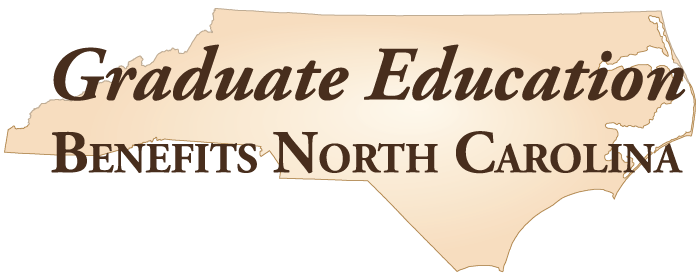North Carolina Council of Graduate Schools

Graduate Education in North Carolina

- Graduate education in the United States has been an enormously successful enterprise, serving the vital scientific, cultural and economic needs of the national and global community.
- Graduate schools are the centers of discovery, innovation, and application, leading to advancements that affect every one of us.

- Bureau of Labor Statistics estimates that more jobs will require people with advanced degrees, specifically an 18% increase in jobs requiring a master's degree and a 17% increase for people with doctoral degrees.
- This is especially true in North Carolina where research and development is critical for the economy in the Research Triangle, the triad and in developing centers on the coast and in the western part of the state.
- Graduate education has a proven track record in job creation through innovation/research and new company start-ups

- Finding innovative solutions to many of the challenges facing the United States and the world in the 21st century will depend upon a creative, knowledgeable, and highly skilled workforce.
- Undergraduate education is important to the creation of a stable economy because it provides students with foundational knowledge and work skills and prepares college graduates for a wide range of employment options. But it is graduate education that provides students with the advanced knowledge and skills that will secure our future intellectual leadership in the knowledge economy.

- Many graduate students come to North Carolina for the high quality of graduate education here and subsequently stay in North Carolina after graduation and contribute in important ways to North Carolina's economic health. They provide a highly trained workforce, pay taxes, and enrich their communities in many ways.
NCCGS Mission and Vision
Mission
The North Carolina Council for Graduate Schools advocates for graduate education across the state of North Carolina, fostering economic and societal growth and helping to ensure graduate students experience transformative opportunities in the classroom, through research, and in engagement within their discipline. We articulate the needs of graduate education with internal and external stakeholders, including influencing public opinion to advance graduate education for the betterment of the students, faculty, staff, and administrators, the citizens of North Carolina, and the global community.
Vision
- We will advocate for optimal learning environments for our students both in curricula and campus culture including promoting academic freedom, quality research practices, and collaboration.
- We will support and encourage diverse research and professional experiences to provide opportunities for graduate students to contribute new knowledge and practice in their disciplines.
- We will engage and communicate with stakeholders including state leaders, UNC System leaders, campus leaders, and regional and national organizations to ensure graduate education remains a primary focus, and we will ensure students participate in this engagement to advance their knowledge and participation in graduate education advocacy.
- We will support faculty, staff, and students involved in graduate education through professional development, networking, and communication.
Approved by the NCCGS Board on March 9, 2023
Fast Facts:
North Carolina Council of Graduate Schools Background Information
- The North Carolina Council of Graduate Schools includes 22 campuses and offers more than 800 master's, doctoral and first professional degree programs in a wide variety of fields, including degrees in high-need areas such as education, social work, engineering, nursing, biomedical and pharmaceutical fields, among others.
- Master's, doctorate, and first professional programs within the North Carolina Council of Graduate Schools enroll more than 56,000 students.
- Academic institutions within the North Carolina Council of Graduate schools award more than 15,000 master's, doctorate, and first professional degrees annually.
Sources:
Statistical Abstract of Higher Education in North Carolina 2007-2008